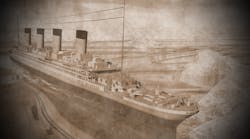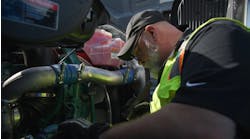We are trying every day to rid ourselves of problems.
People’s imaginations always seem to be concerned with arriving at a place where our problems are solved (money, companionship, housing, health, etc.). We rarely appreciate our problems for having made us stronger. An appreciation of these problems can lead us to build even more reliable systems and processes.
A problem, mistake or accident opens a door to a hidden world. That “problem” world is completely hidden when everything goes right.
A real-world example
Let’s review a historic problem that has been extensively studied: the sinking of the RMS Titanic passenger liner, which hit an iceberg in 1912, on its maiden voyage to New York City from the U.K.
We can look at this example, even superficially, to see the hidden world. Here is a partial list of the reasons the ship sank:
- Collided with iceberg
- No bow watch, no binoculars for crow’s nest
- Rudder too small
- Improper maneuver
- Radio was run 9-5 as a concession (Western Union) and was off at the time and they didn’t hear about the icebergs. Ship’s business and safety were low priority.
- Water tight compartments not water tight
- There was a bad batch of rivets
Every new investigation has uncovered more reasons why the ship sank. Just accepting this short list starts to reveal the hidden world.
First off, if there was no iceberg in the way the ship’s passengers would have happily sailed on to New York, and we would be unaware of these potential or latent defects.
The actual events tell a different story. Hundreds of other defects and potential accidents lurked on that ship.
The sinking threw a spotlight on the defects. People were enraged at the loss of life and property from a supposedly unsinkable ship. Investigations started as the facts were streaming in. Many of these issues were brought forward at inquiries on both sides of the Atlantic.
In fact, many major changes were made to the entire cruising industry that continue to this day. If you take even a short cruise nowadays, one of the first tasks to complete is a muster drill. This emergency drill, completed after passengers board the ship, provides details on emergency procedures and escape routes. This drill is completed for both the passengers and the crew. The ignorance of both groups accounted for (some of) the unnecessarily high loss of life during the sinking of the Titanic.
Takeaways
What does this have to do with fleet maintenance? Just look at any incident, breakdown or accident. When you conduct a root cause analysis you’ll find all kinds of “causes” that had to be present for the incident to take place.
Consider an accident that happened at your facility years ago, when the world opened up. There were all kinds of factors that may have caused the issue -- weather, road conditions, truck mechanical systems, maneuvering, visual acuity, reflex time, anticipation, etc. Now most of these are not easily changeable, but some, like requiring eye exams, drug testing, a CDL license and background checks, to name a few, are now standard practice. A generation of drivers are safer because of the hidden world opened up by reviewing these problems.
Apply this same analysis when confronted by unreliable equipment, low fuel efficiency, excessive time taken in the shop, fuel problems or spare part problems.
You are forced to look
Problems force you to look closely at the system, product or process. You may analyze and see a wide variety of causes. Some of these problems can be addressed at low cost. Taken together, fixing these causes can result in fewer problems in the future because the latent defects might have contributed in different ways to other problems.
The hidden world is revealed by the problem. We feel sad and upset about the loss. But when we exercise defect elimination we have an opportunity to fix these issues on all the ships currently in use and save countless lives over the next 100 years. That is the advantage of problems.
Joel Levitt has trained more than 17,000 maintenance leaders from more than 3,000 organizations in 24 countries. He is the president of Springfield Resources, a management consulting firm that services a variety of clients on a wide range of maintenance issues www.maintenancetraining.com. He is also the designer of Laser-Focused Training, a flexible training program that provides specific targeted training on your schedule, online to one to 250 people in maintenance management, asset management and reliability.




